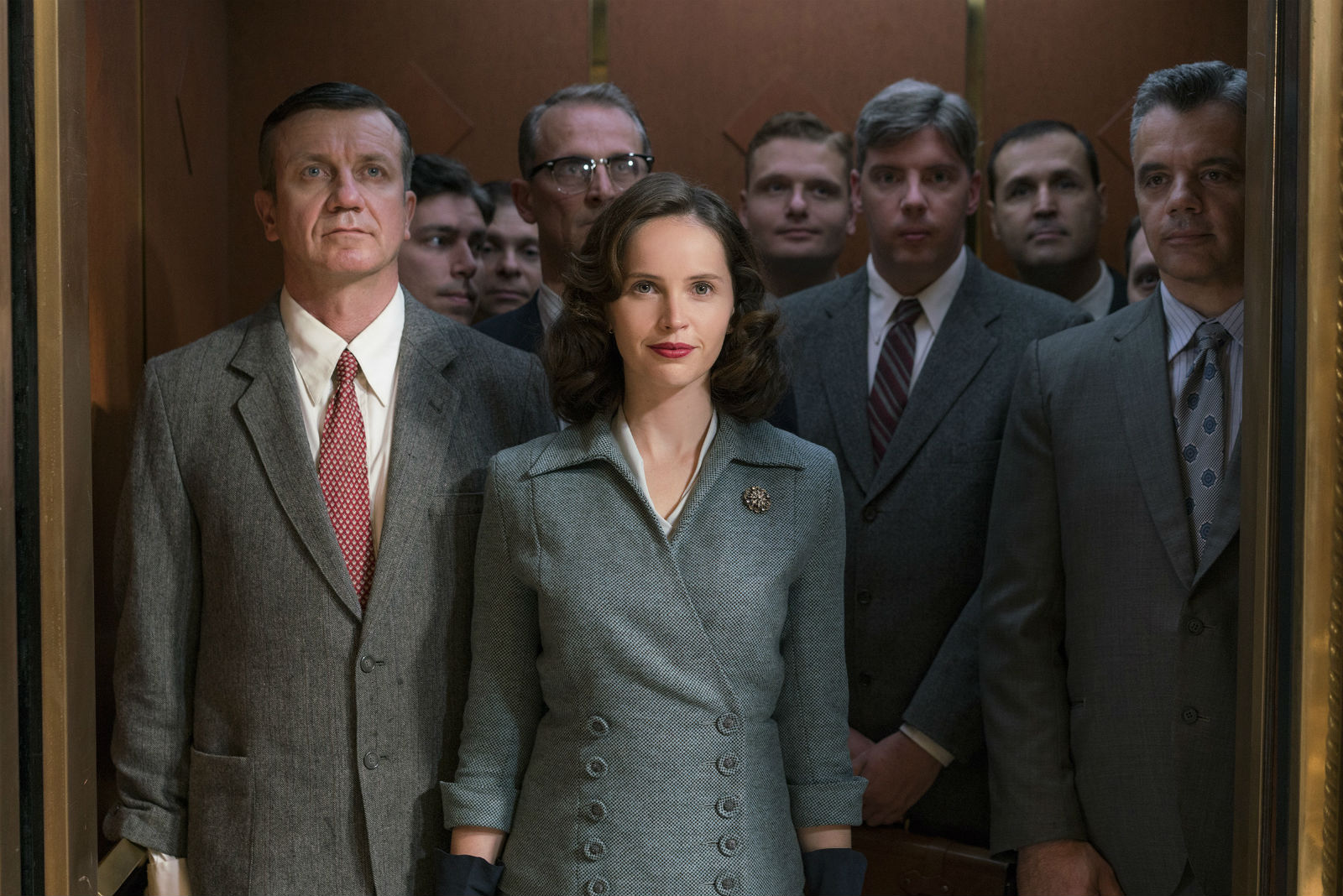On the Basis of Sex: RBG Biopic Delves Into Back Story of Contemporary Folk Hero
By Kim Hughes
Rating: B+
On the Basis of Sex, the starry Hollywood biopic of U.S. Supreme Court Justice Ruth Bader Ginsburg, follows the breathless recent documentary RBG and a subsequent New Yorker cover story which sought to frame Ginsburg’s achievements in a more discerning light.
Felicity Jones as the Notorious RBG…
Which is to say the movie — starring an Americanized Felicity Jones and Armie Hammer as Ruth and Martin Ginsburg, Justin Theroux as fiery ACLU legal director Melvin L. Wulf and a criminally underused Kathy Bates as activist/attorney Dorothy Kenyon— is disseminating history that is fresh in most people’s minds, and imminently searchable on Google.
It’s also serendipitously arriving just as the Brett Kavanaugh episode has prompted a rethink both of the loaded nature of American Supreme Court appointments and whether women will ever be taken seriously when leveling complaints about sexual assault. How far have we really come?
So yeah: the timing is fraught. But is On the Basis of Sex any good? Let’s just say the film — scripted by Bader’s nephew Daniel Stiepelman with the Justice’s blessing — successfully splits the difference between capturing Ginsburg as a contemporary folk hero and as a fiercely ambitious intellectual competing for footing in an era when mixing a killer martini was the very height of wifely prestige. No one will mistake it for a documentary.
The film follows two decades in Ginsburg’s early career, from her start as one of only nine females in a class of 500 at Harvard Law School in the 1950s, through to the early 70s when her role as a trailblazer for equal rights was gathering steam, spearheaded by Moritz v. Commissioner of Internal Revenue which she argued with her husband and which set the stage for overturning notions of gender discrimination under the U.S. constitution.
It’s an unusual choice of period to focus on. To some extent, it’s the least marquee era of Ginsburg’s entire career even as Jones’s ever-evolving wardrobe, from perky sweater sets to Diane von Fürstenberg wrap dresses, keeps us firmly abreast of the times. Yet Stiepelman and filmmaker Mimi Leder seem as keen to emphasize Ginsburg’s home life — her very long and happy marriage to tax lawyer Marty, mother to kids Jane and James — as her successes in arguing that women be recognized as equal under the law, albeit first by showing that gender discrimination could cut both ways.
The film argues that the latter-day Ginsburg, the one standing next to President Bill Clinton in 1993, was formed as much by her family life as by her egalitarian vision of a world. Certainly, scenes of arguments over brisket are more watchable than hours spent poring over dusty constitution-law tomes.
But the set-up seems a bit too convenient, especially since so much of the gender inequality stuff is carried by Sam Waterston as Erwin Griswold, the spectacularly sexist dean of Harvard Law School (when Ginsburg attended) and later, U.S. Solicitor General when Ginsburg was trying the Moritz case.
Institutional sexism may not lend itself easily to visual interpretation, but the opposite approach — casting Griswold and his ilk as woman-hating supervillains — reduces a potent centuries-long, culturally supported practice to paint-by-numbers badness.
Not surprisingly, the film’s climax is a court procedural that is prefaced by a very compelling scene where Ginsburg is rehearsing (and blowing) her delivery before Wulf and two others legal hotshots who shoot down her arguments with startling ease. Ginsburg’s courtroom victories were not done deals, and to the film’s credit, that makes her scan as much more relatable than the soundbite-spewing, weightlifting dynamo depicted in RBG.
Interestingly, numbers seem to factor prominently in On The Basis of Sex: Ginsburg was turned down by 13 law firms despite being the top of her class at both Harvard and Columbia because she was female; for 10 years Griswold fought against allowing women to enter Harvard Law, where Ginsburg was in that rarefied group of 500 students just six years after women were granted entry; her status as only second female justice of four to be confirmed to the court; the 96-3 confirmation vote that sealed the deal; her 56-year marriage to Martin Ginsburg, who died in 2010.
But of course, Ruth Bader Ginsburg remains number one in the hearts of 21st century feminists for whom life alongside men remains a daily and very real battle for parity. Whatever its faults, it’s super-cool that On the Basis of Sex got made, and that a mensch like Ginsburg got her very own movie.
On the Basis of Sex. Directed by Mimi Leder. Starring Felicity Jones, Armie Hammer, Justin Theroux, Kathy Bates and Sam Waterston. Opens wide December 25.

